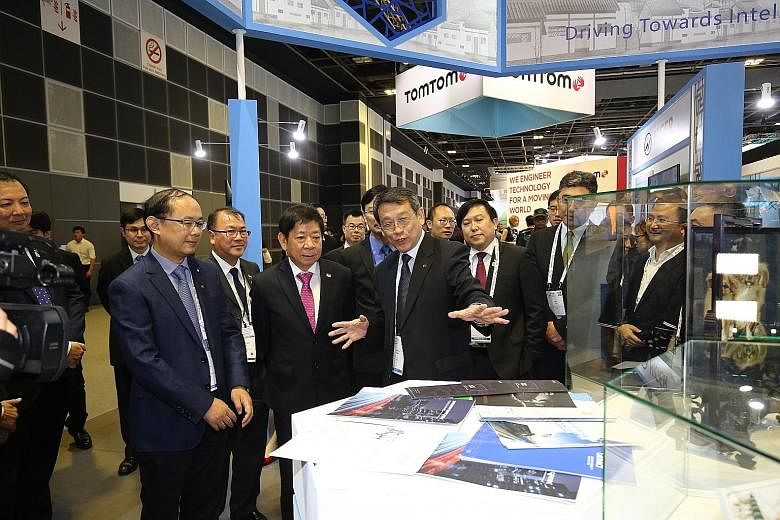Singapore will not rush to be the first in adopting "new-fangled technologies" for essential services like public transport, Transport Minister Khaw Boon Wan said yesterday.
The country's approach, he said, is to explore a wide range of technology platforms before selecting a few promising solutions, based on "hard-headed calculations".
Speaking at the opening of the Intelligent Transport Systems (ITS) World Congress at the Suntec Singapore Convention and Exhibition Centre, Mr Khaw said: "What is crucial is that we are plugged in, and are fully aware of what new technologies are available out there."
By taking part in developing such new technologies through joint research, pilots and trials, Singapore can better assess the state of their maturity, he added. "This allows us to better judge the timing for adoption, and to scale up wisely."
An intelligent transport system must also be a wise one, he said in an opening speech to participants from over 80 countries in the first ITS congress hosted by Singapore.
"As a transport minister, I look beyond the technology element. Politically, what matters is that we have a transport system that is fast, safe, reliable and, very importantly, affordable for all people," he said.
The system has to contribute to their quality of life - the thing that matters to them most, he added.
The minister said there is "no one-size-fits-all" model in this sphere. "For instance, what works for Denmark... may not work as well for Singapore. What works for Singapore today may not be suitable in 10 years' time."
In outlining Singapore's experience with developing ITS, Mr Khaw cited how it is gradually upgrading to the next-generation Electronic Road Pricing system.
As for autonomous vehicles, trials and research are being carried out, and a pilot to ply driverless buses and shuttles is planned for Punggol, Tengah and the Jurong Innovation District by 2022. "I look forward to a larger-scale adoption of autonomous-vehicle technology in Singapore, but I think this will not be in the near future," he said.
Mr Khaw cautioned that while technology can transform societies, it can also divide those who are tech-savvy from the "vast majority" who are not.
"Many may even find the new technology disrupting their livelihood," he said, citing ride-hailing apps such as Uber and Grab. "They have raised the service level to commuters, but they have also threatened the rice bowl of taxi drivers and disrupted the incumbent taxi companies."
Mr Khaw noted that some older commuters were also afraid that they might spell the end of street-hail taxis over time.
There are also technological risks to intelligent systems, he said. "As we make our transport systems more intelligent, we are also introducing them to new vulnerabilities such as cyber attacks," he said.
He pointed to rail systems, which have traditionally been a "walled garden" - meaning, no information goes in or out of the system.
"With the proliferation of sensors and cloud computing, this 'walled garden' is steadily being punctured by external connections to facilitate more efficient rail operations," he said. "A cyber attacker can potentially take control and sabotage the most intelligent of rail systems. The risks can be mitigated, but it requires constant vigilance, costly investments and staff re-training."
While Singapore will not strive to be first in the transport technology race, Mr Khaw said it makes an exception for 5G cellular connection, which the Republic announced last week it will start rolling out over the next few years. He sees "great potential" in the super-fast network, which is necessary for the widespread deployment of autonomous vehicles. "In addition, I see 5G supporting our future Tuas seaport, where we are building a highly automated new-generation port to leverage the new digital economy."
More than 10,000 delegates are expected to attend the congress, which began yesterday and ends on Friday. The event features close to 200 sessions and panel discussions, and 30 technical tours and demonstrations. About 300 exhibitors are also showcasing their latest technologies.


